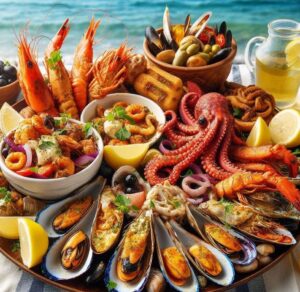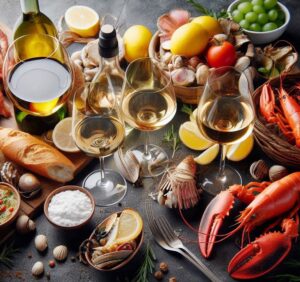Greece’s Geographical Influence on its Cuisine
Greece, with her extensive coastline, over 2000 islands, and position in the heart of the Mediterranean, has seafood woven into the very fabric of her cuisine. The abundance of marine life ensures a plentiful supply of fresh seafood, informing a significant part of Greece’s gastronomic culture.
Greek cuisine is integral to the renowned Mediterranean diet, rich in lean proteins, heart-healthy fats, and antioxidants. Seafood plays a significant role in this diet, recognised globally for its health benefits.
The Culture and Tradition of Seafood in Greece

In traditional Greek culture, one of the days’ key routines is to visit bustling, fragrant local markets in search of the freshest catch. Greece’s cultural identity revolves to a considerable extent around the ocean’s gifts, with the markets playing an essential role in maintaining this rich heritage. Every market, from the busy central markets in Athens or Thessaloniki to small coastal town markets, buzzes with vibrant energy. It’s a daily carnival where the air is filled with the salty scent of the sea and voices calling out the day’s best offerings. Fishermen, their hands roughened by the sea, proudly showcase their catches, vibrant arrays of creatures from the azure depths. Octopus tentacles dangle over trays of silvery fish, their speckliness glistening in the morning sun, inviting the discerning eyes of shoppers.
The story of these catches is one of great tradition as well. Greek fishing methods, a centuries-old lore passed down through generations, remain the charioteers of this vibrant spectacle. The backbone of the Greek seafood industry is formed by small fishing boats known as ‘kaikia’ and larger trawlers that head out into the sea in the early hours. Upon return, they bring an unparalleled freshness that supermarket seafood aisles cannot match. It’s this freshness, coupled with traditional, sustainable fishing practices, that bestows Greek seafood with its delicate flavor and distinct culinary value.
The culture and tradition of seafood in Greece go beyond daily meals or market rituals.It seeps into the country’s festive occasions and religious observances, underscoring seafood’s importance in Greek life. For example, during Greek Easter celebrations, traditionally grilled octopus and crispy, golden-fried calamari often take center stage. The Easter Lenten fast, observed by the devout followers of the Greek Orthodox Church, is a time where meat and dairy products are forsaken. But the fasting period is far from bland. It sees an increase in meals featuring shellfish, molluscs, octopus, and other seafood, resulting in a period filled with culinary ingenuity and gastronomic indulgence using the gifts of the sea.
Most Popular Greek Seafood Dishes
Greek culinary traditions are deeply enriched by a variety of seafood dishes, each bearing witness to the country’s historic geographies entwined with the Mediterranean Sea. A few distinct seafood concoctions have come to symbolize the spirit of Greek cuisine.
Grilled octopus, for example, is not just a dish, but an embodiment of Greece’s seafood traditions. Using Mediterranean octopus, a species known for its tender flesh, this delicacy is carefully prepared. Each tentacle, after being marinated in a rich blend of olive oil and vinegar, is slowly grilled, transforming into a savory dish boasting a good balance of chewiness and softness. The smoky flavor of the char-grill enhances the delicacy, making it a favorite among both locals and tourists.
Saganaki shrimp, another celebrated dish, derives its name from the traditional two-handled frying pan – the Saganaki, in which it is prepared. This dish brings together succulent shrimps, gently sautéed, and then simmered in a tangy tomato sauce. A generous layer of Greek cheese is added before it’s briefly broiled to achieve a beautifully melted and slightly charred finish. This combination of juicy shrimp, sharp tomato, and creamy cheese results in a rich, comforting dish that awakens the palate.
The Greek rendition of calamari is an ode to the country’s affection for this cephalopod. Whether served fried to a golden-crisp finish or stuffed with rich fillings, calamari showcases a pleasing softness and subtle sweet flavor that makes it a perpetual favorite on Greek meze tables.
Baked Sea Bream is another example of the country’s affinity for fresh marine produce. The process starts with a whole Sea Bream, seasoned generously with local herbs and a good squeeze of lemon. It’s then baked nestled in a bed of assorted vegetables. This tasty and nutritious dish stands testament to the Greeks’ love for simple yet flavourful cooking.
Stuffed squid presents the celebration of maritime delicacies during festive times. Calamari tubes are stuffed with a savory mixture of rice, sweet onions, pine nuts, and raisins, creating a dish that’s traditionally savoured at Christmas.
Taramasalata, on the other hand, is a creamy dip made from fish roe, olive oil, lemon juice, and a starchy base of bread or potatoes. This delicately pink spread is a definite crowd-pleaser, whether slathered on warm pita bread or included in a meze spread.
These dishes embrace the bounties of the Aegean Sea and the Ionian Sea, crafting a sensorial journey that blends traditional Greek cooking with the distinct flavors of its seafood. Indulging in these dishes offers not just a gastronomic delight but also a deeper appreciation for the rich cultural tapestry of Greece.
The Wine Pairings of Greek Seafood Dishes

The artful pairing of wine and seafood is a quintessential component of Greek culinary culture. A beautifully balanced synergy of tastes is achieved when the right wine is chosen to complement a certain seafood dish. It’s this unwavering commitment to enhancing gastronomic pleasure that makes Greek cuisine a delightful experience for every food enthusiast.
Assyrtiko, a white wine grown in the volcanic soils of Santorini, carries unique mineral-rich notes and a distinctive acidity. This makes it an ideal match for grilled seafood dishes. The crispness of Assyrtiko offers a delightful contrast to the smoky flavor of grilled fish or octopus, harmonizing the strong flavors inherent in these dishes. So, a kebab of grilled shrimp or squid or a plate of grilled octopus would find a blissful companion in a chilled glass of Assyrtiko.
Then there is Robola, another Greek white wine, renowned for its tantalizing citrus undertones. This wine is grown predominantly on the island of Kefalonia. When paired with seafood dishes that incorporate a lemon twist, Robola amplifies the citrusy notes, enhancing the dish’s overall flavour profile. For instance, a zesty dish such as grilled swordfish with lemon-basil butter or the aforementioned baked sea bream with a squeeze of lemon would benefit beautifully from a Robola pairing.
Savatiano is the most widely planted white grape variety in Greece, particularly central Greece. It is known for its balanced body and flavor. When paired with seafood pastas and casseroles, its fullness and aromatic character uplift the meal, complementing the delicacy of the seafood while standing up to richer sauces. A traditional Greek seafood pasta or a shrimp saganaki casserole, covered in tomato and feta, will reach new heights of flavor when sipped with a glass of Savatiano.
Understanding the diverse Greek wine offerings and their unique flavor profiles enriches the seafood dining experience in Greece. Each pairing not only respects and celebrates the flavors of the dish, but also underscores the country’s abundant vinicultural heritage, making it an integral part of the traditional Greek dining experience.
